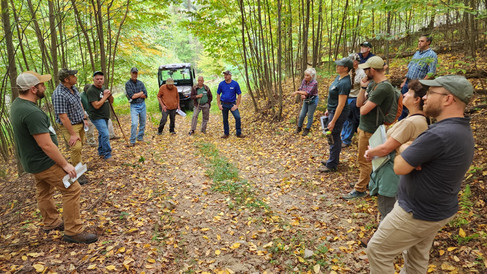Joel's Woods Sustainable Forest Management Field Tour: A Step Toward Partnerships in Land Management
- katie43217
- Oct 8, 2024
- 3 min read
Updated: Oct 9, 2024

On September 18, forestry professionals gathered for Joel's Woods Sustainable Forestry Field Tour, an event aimed at promoting best practices in forest management. Organized by ClearWater ecologist Suzy Yetter and led by foresters Chris Whitsel from Brumbaugh Lumber and Josh Rittenhouse from Audubon Mid-Atlantic, the tour provided valuable insights into sustainable forestry's role in preserving forests, enhancing the environment, and ensuring the future of the timber industry.
Event Highlights
The field tour was an excellent opportunity for participants to exchange ideas, learn from each other, and collaborate on innovative approaches to forest management. ClearWater Conservancy hosted the event, designed to foster collaboration and share valuable knowledge on improving yields and profitability, enhancing forest health, and supporting wildlife habitats.
Agenda
Forest and Timber Management Practices: Explored strategies for optimizing yields and profitability while maintaining forest health and sustainability.
Wildlife Habitat Enhancement: Discussed methods for creating and preserving habitats to meet wildlife goals and objectives.
Challenges and Solutions: Addressed current issues around forest health, such as invasives, diseases, pests, and deer impacts, and explored potential solutions.
Interactive Discussions: Engaged in open dialogue with forest experts and peers to share experiences and insights.
A Diverse Gathering
The tour attracted a diverse group of participants, including forestry consultants, local woodland professionals and representatives from partner organizations such as ClearWater, Audubon Mid-Atlantic, PA DCNR Bureau of Forestry, PA Game Commission, Penn State University, PA Forestry Association and a few landowners, too!
Discussions focused on critical topics affecting forest health, including the removal of invasive species and the management of dead trees affected by spongy moth infestations.
Tackling Invasive Species
A significant focus was on managing invasive species, particularly Japanese stiltgrass (Microstegium vimineum), which flourishes in disturbed areas with more sunlight. Participants explored effective methods for controlling stiltgrass, including the frequency of herbicide treatments needed for long-term control. This hands-on approach underscored the necessity of tailored strategies based on individual landowners’ goals.
Individual Goals and Habitat Management
The tour highlighted the importance of recognizing that individual landowners have distinct intentions for their properties, significantly influencing decisions about species management. For instance, those aiming to create optimal habitat for Ruffed Grouse (Bonasa umbellus) may choose to retain grapevines, while others may remove them to support tree establishment and forest productivity.
The Role of Partnerships
Sustainable forestry is crucial for the preservation of forests, the environment, and the future of the timber industry. Partnerships among forestry professionals and organizations are vital for developing effective forest management practices. Special thanks to our partners who made this experience possible: Audubon Mid-Atlantic, PA Game Commission, PA DCNR Bureau of Forestry, Penn State University and Brumbaugh Lumber.
Looking to the Future
For those interested in learning more about forest management, the PA DCNR Bureau of Forestry offers a wealth of resources. We look forward to more educational experiences like this in the future. If you’d like to experience the forest while combining recreation and education, consider joining us for our Centred Outdoors guided outings in DCNR's forests and other locations in our region.
This field tour not only informed participants about the nuances of forest management but also built a community dedicated to preserving the health of our forests. Here’s to more initiatives that promote sustainability and stewardship in forestry!
This field tour was made possible through a grant from the National Fish and Wildlife Foundation, with support from the U.S. Fish and Wildlife Service.

PA Game Commission Wildlife Biologist, Reina Tyl explains why some grapevines should be retained for grouse.

Mike Eckley, CF and Lecturer in Forestry at Penn State Dubois is on far left. Next is Ryan, then Amy Romaniec (LO), Jonathan Wirth (Forestry Consultant), Andy Bater (PSU), Ray Fye (LO), Danny, Mark Banker (Forest Habitat Specialist), me, and Nate Reiff (Reiff Woodland Services).


















































































































コメント